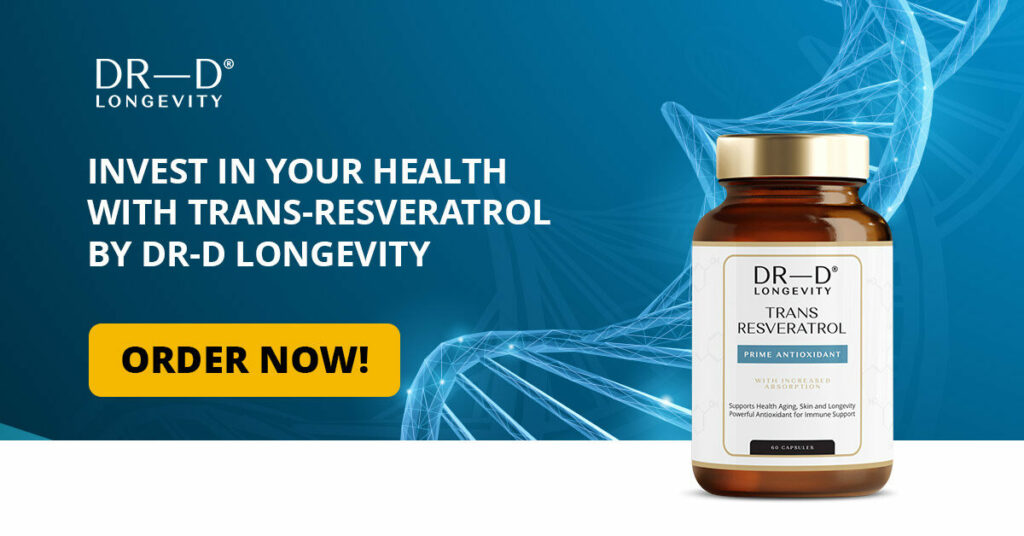Resveratrol: A powerful antioxidant that can change your life

Table of Contents
What is resveratrol and why is it important?
Resveratrol is a natural compound that belongs to the group of polyphenols and is known for its powerful antioxidant properties. It is found in a variety of plants, including grapes, red wine, peanuts, blueberries and other berries.
It first became known thanks to studies on the health benefits of red wine consumption, a phenomenon dubbed the “French paradox” [1].
Trans resveratrol vs. plain resveratrol
Resveratrol exists in two forms – trans and cis. Trans resveratrol is biologically more active and has better absorption by the body, making it the best resveratrol you can take. Taking trans-resveratrol is associated with better absorption into the bloodstream, providing more effective health benefits.
What benefits and properties does resveratrol have?
1. Powerful antioxidant properties
Resveratrol is known for its ability to protect cells from oxidative stress, which is a major cause of premature aging and many chronic diseases. Antioxidants such as resveratrol neutralize free radicals and reduce the risk of cell damage [2].
2. Improving cardiovascular health
Numerous studies have shown that resveratrol can support cardiovascular health by improving blood circulation and reducing levels of “bad” LDL cholesterol. It also supports blood vessel strength and helps prevent plaque buildup on artery walls [3].
3. Anti-aging and longevity
Studies have shown that resveratrol can activate specific genes associated with longevity and slow the aging process. This is due to its ability to maintain cellular DNA health and protect against cellular damage [4].
4. Maintenance of brain function
Resveratrol has the potential to improve memory and cognitive function by increasing blood flow to the brain and protecting neurons from damage. This makes it particularly useful for protecting against neurodegenerative diseases such as Alzheimer’s [5].
5. Anti-inflammatory properties
In addition to its antioxidant activity, resveratrol has strong anti-inflammatory properties. This means it can help reduce inflammatory processes in the body, which is key to maintaining overall health [6].
How to choose the right resveratrol supplement?
- Look for supplements with the concentration of the active ingredient clearly stated, usually in milligrams (mg). A typical dose is between 100 and 500 mg daily.
- Resveratrol is primarily extracted from grape skins, red wine or Japanese crowfoot (Polygonum cuspidatum). Choose products that use high-quality sources.
- Make sure the supplement doesn’t contain harmful additives, GMOs or unnecessary fillers.
- It is optimal to choose trans-resveratrol, which has a higher bioavailability and is more effective compared to cis-resveratrol.
- Choose a product from a reputable manufacturer with clearly stated quality certifications (e.g. GMP or ISO).
Natural source or supplement?
Although resveratrol can be procured from natural sources, its quantity there is relatively small.
Supplements offer a more concentrated form of resveratrol, making it easier to achieve the desired effects without the need to consume large amounts of food.
How is resveratrol taken and what is the recommended dose?
Guide to taking resveratrol
Resveratrol is usually taken in doses between 250 and 500 mg daily, depending on the purpose and health condition of the individual. It is important to note that the recommended dose may vary depending on the specific product and the concentration of resveratrol in it.
It is best taken with food to improve its absorption by the body.
Safety and duration of admission
Resveratrol is safe for long-term intake when taken in recommended doses. However, it is important to consult a doctor, especially if you are taking other medications or have specific health conditions.
Contraindications and side effects
Who should be careful when taking resveratrol?
Although resveratrol is safe for most people, some groups should exercise caution. This includes people with hormone-dependent diseases, such as breast cancer, or those taking blood-thinning medications.
Taking high doses of resveratrol can cause side effects, including stomach upset and diarrhea.
What to do if you experience side effects?
If you experience adverse effects, it is important to discontinue intake and consult a healthcare professional.
Why is resveratrol important to you?
Resveratrol is a powerful antioxidant with numerous health benefits, including heart support, brain and cellular protection. Its ability to protect against aging and support overall health makes it extremely beneficial for daily use.
Sources:
[1] Resveratrol: French Paradox Revisited – https://www.ncbi.nlm.nih.gov/pmc/articles/PMC3398412
[2] Resveratrol-loaded Nanoparticles Induce Antioxidant Activity against Oxidative Stress: https://www.ncbi.nlm.nih.gov/pmc/articles/PMC4698710/
[3] Antioxidant effects of resveratrol in the cardiovascular system:https://bpspubs.onlinelibrary.wiley.com/doi/full/10.1111/bph.13492
[4] Influence of resveratrol on oxidative stress resistance and life span in Caenorhabditis elegans: https://academic.oup.com/jpp/article-abstract/65/5/682/6132993
[5] Resveratrol and Neuroprotection: Impact and Its Therapeutic Potential in Alzheimer’s Disease: https://www.ncbi.nlm.nih.gov/pmc/articles/PMC7804889/
[6] Antioxidative, anti-inflammatory and hepatoprotective effects of resveratrol: https://www.sciencedirect.com/science/article/pii/S1532045618301960
